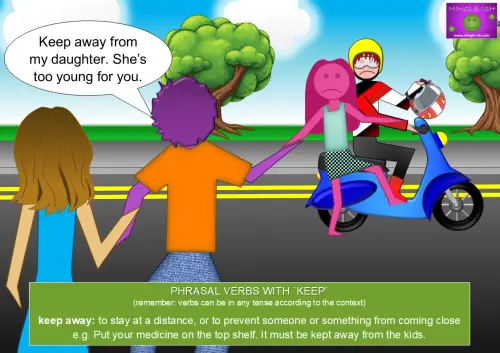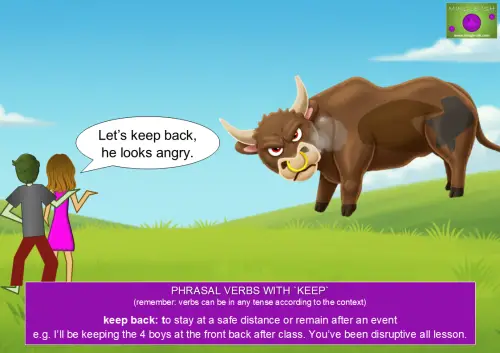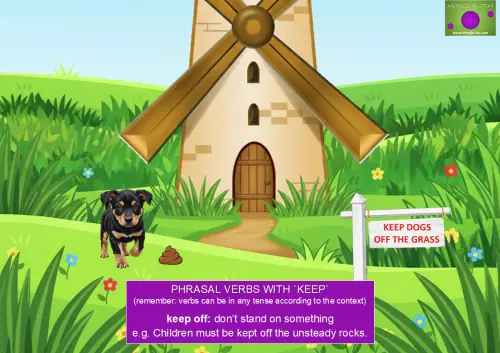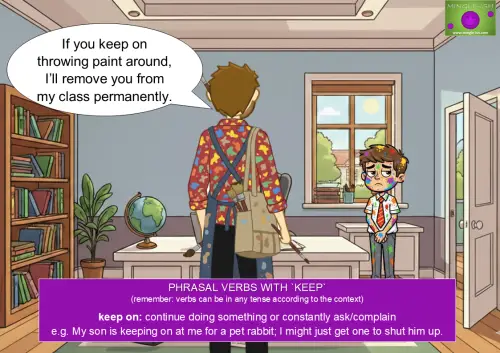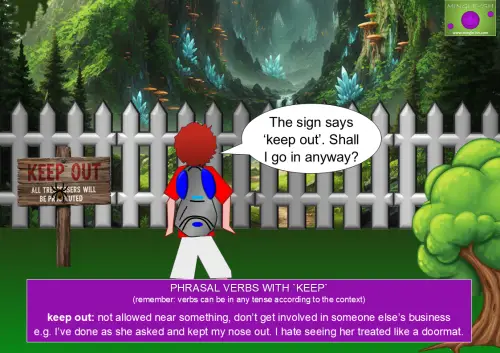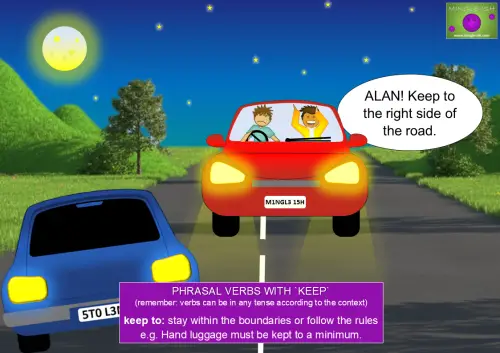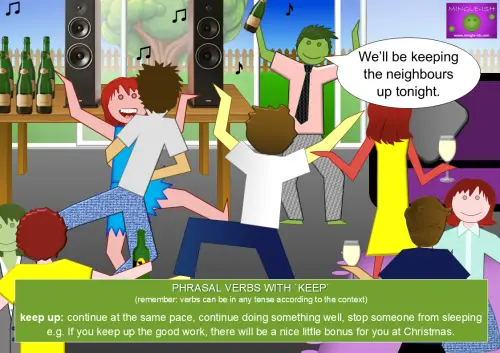Contents
Keep is one of the most versatile verbs in English, and it appears in lots of useful phrasal verbs. On this page, you’ll find a complete guide to phrasal verbs with keep, what they mean, and how to use them in real life. These are great for ESL and EFL learners who want to sound more natural and fluent. Keep reading and see how many you already know!
What does ‘keep’ mean?
The word ‘keep‘ can mean many different things. As a verb, it usually means to continue or to retain possession.
For example:
- Keep walking down the road, then turn left. (continue)
- He said I could keep the blue pen. (retain possession)
Keep is an irregular verb. The past tense is kept and the past participle is kept.
phrasal verbs with keep list
Below is a handy list of the most common phrasal verbs with keep, perfect for ESL and EFL learners. These phrases show how keep combines with different prepositions and adverbs to create unique meanings. Use this list to expand your vocabulary and improve your fluency.

keep around
meaning: have something close to you
examples:
- We are keeping the new guy around. He’s useless but the customers love him.
- I always keep around a notebook in case I need to jot something down.
- She kept around her old teddy bear long after she grew up.
- We’re keeping around the temporary staff because they’re really helpful.
- He has kept around those magazines for years without ever reading them.
- They said they might keep around the old equipment just as a backup.
keep at
meaning: continue doing something difficult
examples:
- Studying medicine was hard, but I kept at it and graduated this yea
- I know it’s tough, but if you keep at it, you’ll get better.
- She kept at her painting until it was perfect.
- You need to keep at your studies to pass the exam.
- They’ve been keeping at the project all week.
- If he had kept at it, he would have finished by now.
keep away
meaning: to stay at a distance, or to prevent someone or something from coming close
examples:
- Keep away from that fire, it’s dangerous.
- You need to keep away from junk food if you want to feel healthier.
- She told her brother to keep away while she was studying.
- Keep away from the edge, it’s slippery.
- They tried to keep the dogs away from the kitchen while cooking.
- If he had kept away from trouble, he wouldn’t be in this mess now.
keep back
meaning: to stay at a safe distance, or to remain after a lesson, meeting, or event
examples:
- Keep back from the edge, it’s really dangerous.
- The police asked everyone to keep back while they cleared the area.
- I was kept back after the meeting to answer a quick question.
- She’s been keeping back from the crowd because she doesn’t feel well.
- We’ll need to keep the children back until their parents arrive.
- He kept back when the dog started barking.
- I’ll keep the group back for a minute so I can explain the homework properly.
- If they had kept back like they were told, they wouldn’t have got hurt.
keep (something) from
meaning: stop someone doing something or hide information from someone
examples:
- The stress of work is keeping me from sleeping.
- I’ve been keeping this from my girlfriend, but today I’m going to tell her.
- He tried to keep the children from touching the hot stove.
- She couldn’t keep herself from laughing during the serious meeting.
- They kept the news from us until the project was finished.
- Please keep your phone from ringing during the performance.
- I couldn’t keep him from finding out the truth.
- We need to keep the dog from running into the road.
- She kept her feelings from showing, even though she was upset.
keep in
meaning: to not allow someone or something to go outside, or to make someone stay inside; also, to stop yourself expressing emotions or thoughts
examples:
- The teacher kept us in after class because we were talking too much.
- It’s freezing today, so we’re keeping the cat in.
- I was kept in at lunchtime to finish my homework.
- The doctor said I should keep the dog in until her paw heals.
- Because of the storm, they kept everyone in until it was safe to leave.
- Try to keep the children in while the builders are working outside.
- I tried to keep my excitement in, but I ended up smiling anyway.
- She kept her feelings in during the meeting and talked about them later.
- He couldn’t keep his anger in when he heard the news.
- I’ve been keeping this secret in for so long that it’s stressing me out.
keep in with
meaning: to stay friendly with someone, often for practical reasons or to maintain a good relationship
examples:
- I’m only keeping in with them so I can get transferred to France.
- Although we’re divorced, I’ve kept in with the in-laws.
- She tries to keep in with her neighbours so things stay peaceful.
- He keeps in with his boss because he wants a promotion.
- We’ve been keeping in with the landlord so we don’t lose the flat.
- They kept in with the organisers to make sure they were invited back next year.
- I’m keeping in with my old team even though I’ve moved departments.
- She kept in with her tutors, which really helped during exam season.
- He’s only keeping in with those people because they know important contacts.
- If you want good references, it’s worth keeping in with your previous employer.
keep off
meaning: to avoid stepping on, standing on, or going onto something; also used to tell people not to touch or use something
examples:
- Please keep off the grass while it’s being watered.
- Children must be kept off the unsteady rocks.
- The sign said to keep off the newly painted steps.
- I tried to keep the dog off the sofa, but he jumped up anyway.
- They kept everyone off the beach during the storm.
- Keep off that path, it’s too slippery today.
- He was told to keep off the ice because it wasn’t thick enough.
- We’re keeping the kids off the muddy field until the match starts.
- She asked him to keep off her laptop while she was working.
- If you’d kept off the broken bridge, you wouldn’t have fallen.
keep on
meaning: to continue doing something; also, to repeatedly ask, complain, or nag (usually keep on at someone for something)
examples:
- He kept on talking even after everyone told him to stop.
- If you keep on throwing paint around, I’ll remove you from my class permanently.
- She kept on practising until she finally got the dance right.
- My son is keeping on at me for a pet rabbit; I might just get him one to shut him up.
- They kept on working through the night to finish the project.
- I don’t know how he keeps on smiling with all that stress.
- She kept on at her boss about taking holiday until he agreed.
- We kept on walking even though it started raining.
- He keeps on complaining about his job but won’t do anything to change it.
- I kept on reminding her, but she still forgot the appointment.
keep out
meaning: to stop someone or something from entering a place, or to stay away from an area because it’s private, dangerous, or restricted; also, to stay out of someone’s personal business or situation
examples:
- The sign says ‘Keep out’, so we shouldn’t go in.
- I’ve told him to keep out of my business — it’s nothing to do with him.
- She tried to keep out of their argument, but they dragged her in anyway.
- They put up a fence to keep people out of the construction site.
- Please keep out of my room while I’m sorting through my things.
- He warned me to keep out of it, but I couldn’t help trying to help.
- During the flood, emergency services kept everyone out of the town centre.
- We need to keep the cats out of the kitchen while the builders are working.
- I told the kids to keep out of the shed because it’s full of sharp tools.
- Keep out of the attic for now — there are loose floorboards.
keep to
meaning: to stay within limits, boundaries, or guidelines; also, to follow rules, plans, or agreed behaviour
examples:
- Please keep to the speed limit — this road is monitored.
- Hand luggage must be kept to a minimum.
- Try to keep to the path, the grass has just been replanted.
- We need to keep to the schedule if we want to finish on time.
- She kept to her promise and called every week.
- I’m trying to keep to a healthier diet this month.
- He couldn’t keep to the rules, so he was asked to leave the group.
- They kept to their budget by planning everything carefully.
- Keep to your side of the table; I need room to work.
- If everyone keeps to the guidelines, the event will run smoothly.
keep up
meaning: continue at the same level or pace, or keep doing something well; also, stop someone from sleeping
examples:
If you keep up the good work, you’ll get that bonus at Christmas.
She walks so fast that I can’t keep up with her.
Try to keep up the pace or we’ll fall behind schedule.
We’ll be keeping the neighbours up tonight if we’re not careful.
He kept me up all night with his constant coughing.
They’ve managed to keep up their impressive results all year.
I don’t know how he keeps up such a positive attitude.
Keep up with the instructions and you won’t get lost.
She couldn’t keep up when the class got more advanced.
If we keep up the pressure, they’ll eventually agree.
keep up with
meaning: to stay at the same pace as someone or something, to remain informed about news or developments, or to maintain the same level in a situation
examples:
- I can barely keep up with all the new episodes of that show.
- She tries to keep up with the latest fashion trends.
- I needed to keep up with my emails yesterday, but I ran out of time.
- He is running so fast that I can’t keep up with him.
- We managed to keep up with the others on the hike despite the rain.
- I like keeping up with current affairs by reading the newspaper every morning.
- She struggles to keep up with her schoolwork when she misses a few days.
- We need to keep up with our competitors if we want to stay in business.
- He has so many hobbies it’s difficult to keep up with everything he’s doing.
- They will have to keep up with the new schedule once the changes start next week.
- I’m trying to keep up with the latest tech news, but it’s overwhelming.
You can download a summary table of phrasal verbs with keep below to study at your leisure.
Test Your Knowledge: Quizzes on Phrasal Verbs with Keep
Test your knowledge of phrasal verbs with keep! Try these quizzes to learn meanings and usage, and head to our YouTube channel for even more fun lessons and practice.
conclusion
Mastering phrasal verbs with keep can make your English sound much more natural and confident. From keep up with to keep out and keep on, practicing these verbs with examples and quizzes will help you use them correctly in everyday situations. Keep exploring, keep practising, and don’t forget to check out our YouTube channel for more lessons, quizzes, and tips to boost your English skills!


